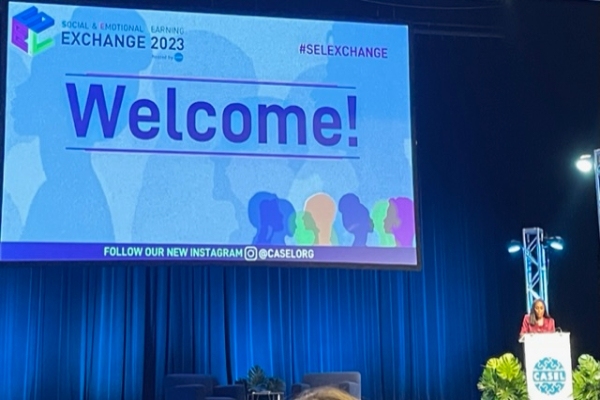We Teach Who We Are

Last week, I had the privilege of attending the 2023 SEL Exchange Conference, hosted by CASEL, a prominent gathering dedicated to Social and Emotional Learning (SEL) in the United States. The theme, “Leaders as Learners: Building the Village Our Children Need”, signaled a crucial emphasis on supporting the growth and development of adults serving young people.
Parker J. Palmer’s famous quote, “We teach who we are,” encapsulates my experience at this conference. Being part of the SEL movement for over a decade, witnessing 1700+ individuals convening to teach, learn, and foster a sense of community was both humbling and invigorating. The sense of a united family was palpable. If you were there and we missed connecting, please feel free to reach out.
The solid foundation of SEL continues to grow. The conference exemplified this growth with over 350 sessions hosted by CASEL over three days, showcasing diverse presenters and addressing numerous themes—from parent engagement and academic integration to adult development and systemic SEL.
However, as the field of SEL expands, there exists a risk of diluting authenticity, losing rigor, and forgetting the core reasons motivating our work. In my writings, I have highlighted some of these risks–misconceptions about SEL, adult SEL matters, and the need to reclaim SEL. During the conference, Meena Srinivasan, an esteemed colleague and influential educator specializing in SEL and mindfulness in education, posed a pivotal question:
“What is SEL in service of?”
Reflecting on the conference sessions I attended, here are some key takeaways:
Regarding Educators
Teacher development and expertise need to include professional identity knowledge.
Bennett Pierce Professor of Caring and Compassion at Penn State, Dr. Robert Roeser, emphasized the importance of professional identity knowledge in teacher development and expertise. He introduced a fourth domain of teacher expertise—professional identity knowledge—complementing existing domains like developmental, pedagogical, and subject matter knowledge. This domain delves into educators’ emotional, attentional, and social skill development, now recognized as Adult SEL or teacher presence.
Dr. Roeser defined a “good” SEL teacher as one who “masters, embodies and models for others virtuous attentional and social-emotional skills and ethical dispositions in their daily behavior and social interactions; and who is present, aware, emotionally balanced, open, curious and kind, and ready to teach SEL or any other subject matter in the classroom from a place of authenticity and care.”
Achieving this may seem demanding, but it’s an expertise domain that can be cultivated. This underlines why adult SEL remains a primary focus of my work at HEART in Mind and inspired the creation of the adult SEL program, Growing Your HEART Skills.
For deeper insights into Dr. Roeser’s research, I encourage exploring this article and podcast.
Regarding Students
SEL needs to incorporate liberatory teaching practices.
In their session, Dr. Dena Simmons and the LiberatED team defined liberatory teaching practices as those practices that “create the conditions for all children to live, learn, and thrive in the comfort of their own skin.” These practices include celebrating and welcoming learners’ identities as assets, contributing to a sense of belonging, holding students to fair and high expectations, and honoring the genius in all learners, among others. In order to make this happen, the educator needs to develop a liberatory mindset and with intentionality support individual and collective healing from racial harm.
Aligning SEL work with values of justice, radical love, and collective liberation poses challenges within systems that often oppress and marginalize individuals and communities. Dr. Simmons advocates that liberating ourselves precedes liberating others, a courageous endeavor.
Being amidst courageous individuals like Dena amplifies my resolve to be valiente, speak from the HEART, and undertake necessary work for the sake of children and youth.
For deeper insights, make sure you follow Dr. Dena Simmons and LiberatED.
Regarding Leaders
Nurturing the inner lives of educational leaders is the bridge to outer systemic transformation in schools.
Meena Srinivasan and the Transformative Educational Leadership team (TEL) have developed a leadership program that integrates the inner life of mind and spirit with the outer life of service and action. TEL aims to create a community of belonging, where leaders can bring their full selves–including their spiritual roots–so they can “become who they are meant to be.”
During this session, we pondered the possibilities of honoring the spiritual dimension in SEL work. This is the first time that I have seen an intentional focus on welcoming the inner spiritual lives of leaders into the transformational work of leadership and supporting students’ social, emotional, and academic growth. I look forward to seeing the impact of this work.
For further exploration, I suggest visiting TEL’s website and fellowship program.
Regarding Families
Parent-led communities of practice can support parents to lead their own learning and growth.
In a session I co-presented with esteemed colleagues, we delved into how parent-led communities of practice can foster parents’ independent learning and growth. We discussed limiting beliefs surrounding how schools engage parents and the barriers obstructing authentic engagement. We showcased examples of parent communities coming together to learn, grow, and support each other.
It’s necessary to recognize that parents possess a voice that must be actively heard. They are vital contributors to the learning communities within school buildings and towns. Neglecting their perspectives overlooks an opportunity for connection, mutual understanding, and support.
For further insights, I recommend exploring Jennifer Miller’s post summarizing our session.
Regarding SEL
Ultimately, this work thrives if we do it in community. Collaboration and nurturing each other’s HEARTs are crucial in developing a new pedagogical framework where SEL forms the core of teaching and learning. Know that the HEART in Mind community stands as your village—a source of support and inspiration whenever you need it.
Subscribe to the HEART in Mind Newsletter
Research-Based Strategies for your SEL Toolbox














